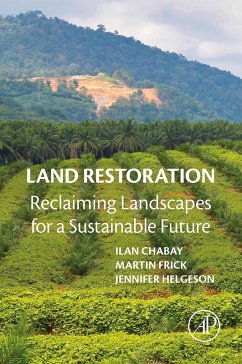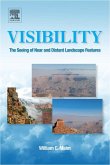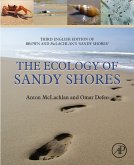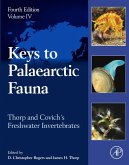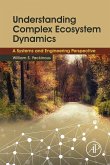Land Restoration (eBook, ePUB)
Reclaiming Landscapes for a Sustainable Future
Redaktion: Chabay, Ilan; Helgeson, Jennifer; Frick, Martin


Alle Infos zum eBook verschenken

Land Restoration (eBook, ePUB)
Reclaiming Landscapes for a Sustainable Future
Redaktion: Chabay, Ilan; Helgeson, Jennifer; Frick, Martin
- Format: ePub
- Merkliste
- Auf die Merkliste
- Bewerten Bewerten
- Teilen
- Produkt teilen
- Produkterinnerung
- Produkterinnerung

Hier können Sie sich einloggen

Bitte loggen Sie sich zunächst in Ihr Kundenkonto ein oder registrieren Sie sich bei bücher.de, um das eBook-Abo tolino select nutzen zu können.
Land Restoration: Reclaiming Landscapes for a Sustainable Future provides a holistic overview of land degradation and restoration in that it addresses the issue of land restoration from the scientific and practical development points of view. Furthermore, the breadth of chapter topics and contributors cover the topic and a wealth of connected issues, such as security, development, and environmental issues. The use of graphics and extensive references to case studies also make the work accessible and encourage it to be used for reference, but also in active field-work planning.
Land…mehr
- Geräte: eReader
- ohne Kopierschutz
- eBook Hilfe
![Visibility (eBook, ePUB) Visibility (eBook, ePUB)]() William MalmVisibility (eBook, ePUB)53,95 €
William MalmVisibility (eBook, ePUB)53,95 €![The Ecology of Sandy Shores (eBook, ePUB) The Ecology of Sandy Shores (eBook, ePUB)]() Anton McLachlanThe Ecology of Sandy Shores (eBook, ePUB)78,95 €
Anton McLachlanThe Ecology of Sandy Shores (eBook, ePUB)78,95 €![Coral Reef Restoration Handbook (eBook, ePUB) Coral Reef Restoration Handbook (eBook, ePUB)]() Coral Reef Restoration Handbook (eBook, ePUB)64,95 €
Coral Reef Restoration Handbook (eBook, ePUB)64,95 €![Quaternary Ecology, Evolution, and Biogeography (eBook, ePUB) Quaternary Ecology, Evolution, and Biogeography (eBook, ePUB)]() Valentí RullQuaternary Ecology, Evolution, and Biogeography (eBook, ePUB)80,95 €
Valentí RullQuaternary Ecology, Evolution, and Biogeography (eBook, ePUB)80,95 €![Thorp and Covich's Freshwater Invertebrates (eBook, ePUB) Thorp and Covich's Freshwater Invertebrates (eBook, ePUB)]() Thorp and Covich's Freshwater Invertebrates (eBook, ePUB)90,95 €
Thorp and Covich's Freshwater Invertebrates (eBook, ePUB)90,95 €![Understanding Complex Ecosystem Dynamics (eBook, ePUB) Understanding Complex Ecosystem Dynamics (eBook, ePUB)]() William S. YackinousUnderstanding Complex Ecosystem Dynamics (eBook, ePUB)73,95 €
William S. YackinousUnderstanding Complex Ecosystem Dynamics (eBook, ePUB)73,95 €![The Milkweed Lands (eBook, ePUB) The Milkweed Lands (eBook, ePUB)]() Eric Lee-MäderThe Milkweed Lands (eBook, ePUB)12,99 €
Eric Lee-MäderThe Milkweed Lands (eBook, ePUB)12,99 €-
-
-
Land Restoration: Reclaiming Landscapes for a Sustainable Future brings together practitioners from NGOs, academia, governments, and the United Nations Convention to Combat Desertification (UNCCD) to exchange lessons to enrich the academic understanding of these issues and the solution sets available.
- Provides accessible information about the science behind land degradation and restoration for those who do not directly engage with the science allowing full access to the issue at hand.
- Includes practical on-the-ground examples garnered from diverse areas, such as the Sahel, Southeast Asia, and the U.S.A.
- Provides practical tools for designing and implementing restoration/re-greening processes.
Dieser Download kann aus rechtlichen Gründen nur mit Rechnungsadresse in A, B, BG, CY, CZ, D, DK, EW, E, FIN, F, GR, HR, H, IRL, I, LT, L, LR, M, NL, PL, P, R, S, SLO, SK ausgeliefert werden.
- Produktdetails
- Verlag: Elsevier Science & Techn.
- Seitenzahl: 598
- Erscheinungstermin: 8. Oktober 2015
- Englisch
- ISBN-13: 9780128013533
- Artikelnr.: 43983310
- Verlag: Elsevier Science & Techn.
- Seitenzahl: 598
- Erscheinungstermin: 8. Oktober 2015
- Englisch
- ISBN-13: 9780128013533
- Artikelnr.: 43983310
- Herstellerkennzeichnung Die Herstellerinformationen sind derzeit nicht verfügbar.
He is honorary member of Swiss Academy of Social Sciences and Humanities, served on Scientific Committee of the International Human Dimensions Programme (IHDP) and Science & Technical Committee of UN International Strategy for Disaster Reduction.
He was Hasselblad Professor in sociology and applied IT departments at University of Gothenburg and Chalmers University 2006-2011, consulting professor of chemistry at Stanford University 1984-1988. In Silicon Valley he founded and directed The New Curiosity Shop from 1983-2001, which designed and produced hands-on science exhibitions for over 200 science centers worldwide.
His Ph.D. is in chemical physics from University of Chicago.
Martin Frick is the Representative of Germany to the International Organisations based in Germany, including the Secretariats of the UN convention to combat climate change, UNFCCC, and the UN Convention to Combat Desertification, UNCCD. He was E3G's Programme Leader for Climate Diplomacy from November 2010 to June 2012. Martin has been a German diplomat since 1996. He served as the German representative for human rights and humanitarian affairs at the United Nations General Assembly from 2005 to 2007. Prior to his work in New York, Martin served as Consul and as Deputy Ambassador in Albania from 1999-2002. From 2002-2005 he was the Cabinet Affairs Advisor to German Federal Foreign Minister Joschka Fischer. Between 2007-2010 he was Deputy CEO/Director of the Global Humanitarian Forum, a Geneva based foundation set up by former UN-Secretary General Kofi Annan. From the early days of this foundation Martin formed the content and strategic orientation of the Forum's work.
Governing Land Restoration: Four Hypotheses
Introduction
Part 1 Social contexts of land restoration
Chapter 1.1 Land Degradation as a Security Threat Amplifier: The New Global Frontline
Chapter 1.2 Land Degradation and Its Impact on Security
Chapter 1.3 (Em)Powering People: Reconciling Energy Security and Land-Use Management in the Sudano-Sahelian Region
Chapter 1.4 Enabling Governance for Sustainable Land Management
Part 2 Concepts and Methodologies for restoration and maintenance
Chapter 2.1 Tenets of Soil and Landscape Restoration
Chapter 2.2 Stabilization of Sand Dunes: Do Ecology and Public Perception Go Hand in Hand?
Chapter 2.3 Trust Building and Mobile Pastoralism in Africa
Chapter 2.4 Land Degradation from Military Toxins: Public Health Considerations and Possible Solution Paths
Chapter 2.5 Flood and Drought Prevention and Disaster Mitigation: Combating Land Degradation with an Integrated Natural Systems Strategy
Chapter 2.6 Environmental Security, Land Restoration, and the Military: A Case Study of the Ecological Task Forces in India
Chapter 2.7 Releasing the Underground Forest
Part 3 Soil, Water, and Energy - The Relationship to Land Restoration
Chapter 3.1 Computational Policy Support Systems for Understanding Land Degradation Effects on Water and Food Security for and from Africa
Chapter 3.2 The Value of Land Restoration as a Response to Climate Change
Part 4 Economics, Policy, and Governance of Land Restoration
Chapter 4.1 The Importance of Land Restoration for Achieving a Land Degradation-Neutral World Chapter 4.2 Transforming Land Conflicts into Sustainable Development: A Case of the Taita Taveta of Kenya
Chapter 4.3 Case Study: Taranaki Farm Regenerative Agriculture. Pathways to Integrated Ecological Farming
Chapter 4.4 Regenerating Agriculture to Sustain Civilization
Chapter 4.5 Land Degradation: An Economic Perspective
Chapter 4.6 Four Returns, Three Zones, 20 years: A Systemic Approach to Scale Up Landscape Restoration by Business and Investors to Create a Restoration Industry
Chapter 4.7 Restoring Degraded Ecosystems by Unlocking Organic Market Potential: Case Study from Mashonaland East, Zimbabwe
Chapter 4.8 A Continuing Inquiry into Ecosystem Restoration: Examples from China's Loess Plateau and Locations Worldwide and Their Emerging Implications
Part 5 The Community as a Resource for Land Restoration
Chapter 5.1 Poverties and Wealth: Perceptions, Empowerment, and Agency in Sustainable Land Management
Chapter 5.2 All Voices Heard: A Conflict Prevention Approach to Land and Natural Resources
Part 6 Gender in the Context of Land Restoration
Chapter 6.1 Land Restoration, Agriculture, and Climate Change: Enriching Gender Programming Through Strengthening Intersectional Perspectives
Chapter 6.2 Gender Roles and Land Use Preferences - Implications to Landscape Restoration in Southeast Asia
Part 7 Communities, Restoration, and Resilience
Chapter 7.1 Drought-Management Policies and Preparedness Plans: Changing the Paradigm from Crisis to Risk Management
Chapter 7.2 Not the Usual Suspects: Environmental Impacts of Migration in Ghana's Forest-Savanna Transition Zone
Chapter 7.3 The Global Restoration Initiative
Part 8 Selected Case Studies
Chapter 8.1 Indigenuity: Reclaiming Our Relationship with the Land
Chapter 8.2 Land Restoration and Community Trust: Keys to Combating Poverty
Chapter 8.3 Shifting from Individual to Collective Action: Living Land's Experience in the Baviaanskloof, South Africa
Chapter 8.4 Development and Success, For Whom and Where: The Central Anatolian Case
Chapter 8.5 Sharing Knowledge to Spread Sustainable Land Management (SLM)
Part 9 Suggestions for Ways to Use this Book
Cha
Governing Land Restoration: Four Hypotheses
Introduction
Part 1 Social contexts of land restoration
Chapter 1.1 Land Degradation as a Security Threat Amplifier: The New Global Frontline
Chapter 1.2 Land Degradation and Its Impact on Security
Chapter 1.3 (Em)Powering People: Reconciling Energy Security and Land-Use Management in the Sudano-Sahelian Region
Chapter 1.4 Enabling Governance for Sustainable Land Management
Part 2 Concepts and Methodologies for restoration and maintenance
Chapter 2.1 Tenets of Soil and Landscape Restoration
Chapter 2.2 Stabilization of Sand Dunes: Do Ecology and Public Perception Go Hand in Hand?
Chapter 2.3 Trust Building and Mobile Pastoralism in Africa
Chapter 2.4 Land Degradation from Military Toxins: Public Health Considerations and Possible Solution Paths
Chapter 2.5 Flood and Drought Prevention and Disaster Mitigation: Combating Land Degradation with an Integrated Natural Systems Strategy
Chapter 2.6 Environmental Security, Land Restoration, and the Military: A Case Study of the Ecological Task Forces in India
Chapter 2.7 Releasing the Underground Forest
Part 3 Soil, Water, and Energy - The Relationship to Land Restoration
Chapter 3.1 Computational Policy Support Systems for Understanding Land Degradation Effects on Water and Food Security for and from Africa
Chapter 3.2 The Value of Land Restoration as a Response to Climate Change
Part 4 Economics, Policy, and Governance of Land Restoration
Chapter 4.1 The Importance of Land Restoration for Achieving a Land Degradation-Neutral World Chapter 4.2 Transforming Land Conflicts into Sustainable Development: A Case of the Taita Taveta of Kenya
Chapter 4.3 Case Study: Taranaki Farm Regenerative Agriculture. Pathways to Integrated Ecological Farming
Chapter 4.4 Regenerating Agriculture to Sustain Civilization
Chapter 4.5 Land Degradation: An Economic Perspective
Chapter 4.6 Four Returns, Three Zones, 20 years: A Systemic Approach to Scale Up Landscape Restoration by Business and Investors to Create a Restoration Industry
Chapter 4.7 Restoring Degraded Ecosystems by Unlocking Organic Market Potential: Case Study from Mashonaland East, Zimbabwe
Chapter 4.8 A Continuing Inquiry into Ecosystem Restoration: Examples from China's Loess Plateau and Locations Worldwide and Their Emerging Implications
Part 5 The Community as a Resource for Land Restoration
Chapter 5.1 Poverties and Wealth: Perceptions, Empowerment, and Agency in Sustainable Land Management
Chapter 5.2 All Voices Heard: A Conflict Prevention Approach to Land and Natural Resources
Part 6 Gender in the Context of Land Restoration
Chapter 6.1 Land Restoration, Agriculture, and Climate Change: Enriching Gender Programming Through Strengthening Intersectional Perspectives
Chapter 6.2 Gender Roles and Land Use Preferences - Implications to Landscape Restoration in Southeast Asia
Part 7 Communities, Restoration, and Resilience
Chapter 7.1 Drought-Management Policies and Preparedness Plans: Changing the Paradigm from Crisis to Risk Management
Chapter 7.2 Not the Usual Suspects: Environmental Impacts of Migration in Ghana's Forest-Savanna Transition Zone
Chapter 7.3 The Global Restoration Initiative
Part 8 Selected Case Studies
Chapter 8.1 Indigenuity: Reclaiming Our Relationship with the Land
Chapter 8.2 Land Restoration and Community Trust: Keys to Combating Poverty
Chapter 8.3 Shifting from Individual to Collective Action: Living Land's Experience in the Baviaanskloof, South Africa
Chapter 8.4 Development and Success, For Whom and Where: The Central Anatolian Case
Chapter 8.5 Sharing Knowledge to Spread Sustainable Land Management (SLM)
Part 9 Suggestions for Ways to Use this Book
Cha
